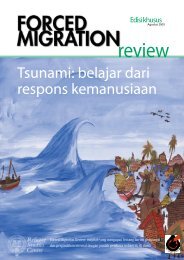FMR 42 full issue pdf - Forced Migration Review
FMR 42 full issue pdf - Forced Migration Review
FMR 42 full issue pdf - Forced Migration Review
You also want an ePaper? Increase the reach of your titles
YUMPU automatically turns print PDFs into web optimized ePapers that Google loves.
52 Sexual orientation and gender identity and the protection of forced migrants<br />
<strong>FMR</strong> <strong>42</strong><br />
Identity and integration in Israel and Kenya<br />
Yiftach Millo<br />
Expression of non-conforming sexual orientation and gender identity depends on social, legal,<br />
cultural and political opportunities which provide space for exploration and the emergence of<br />
new identities. People’s protection will also depend on these.<br />
Sexual minority refugees and asylum seekers<br />
interviewed in Israel and Kenya had fled<br />
countries such as Armenia, the Democratic<br />
Republic of Congo (DRC), Ethiopia, Morocco,<br />
Somalia, Sri Lanka and Sudan where the<br />
LGBTI discourse is almost non-existent:<br />
“There is no such thing in Morocco as sexual<br />
identity, forget it. Sexual identity is a Western<br />
‘invention’. It’s either you’re a man or a woman.<br />
If you’re in the margin, then you’re a male<br />
whore.” (Gay Moroccan asylum seeker)<br />
On arrival in their new country, most were<br />
exposed for the first time to LGBTI rights<br />
discourse through encounters with the local<br />
population, local sexual minorities, LGBTI<br />
advocates, refugee assistance agents, medical<br />
and psychosocial service providers, and<br />
media coverage. After an initial period of<br />
establishing contacts with other refugees,<br />
asylum seekers and migrants from their<br />
countries of origin, the majority tend to start<br />
to disengage from these communities and<br />
attempt instead to integrate with the local<br />
population, gradually adopting LGBTI selfrepresentations.<br />
This process is lengthy and<br />
characterised by greater vulnerability due<br />
to lack of confidence in approaching refugee<br />
assistance and LGBTI networks or advocates.<br />
Israel<br />
Israel is considered tolerant of nonconforming<br />
sexual orientations and gender<br />
identities, and in this environment sexual<br />
minority asylum seekers are more able to<br />
reconfigure and be open about their sexual<br />
orientation and/or gender identity. Such<br />
opportunities, however, are dependent on a<br />
person’s language skills and encounters with<br />
trusted social agents (mainly gay-friendly<br />
employers). Access to protection is still limited<br />
and many sexual minority asylum seekers in<br />
Israel only approach refugee assistance agents<br />
or LGBTI advocates months if not years after<br />
arrival in Israel, thereby often missing the<br />
one-year deadline for submission of asylum<br />
claims to the Population, Immigration and<br />
Border Authority (PIBA). In addition, fixed<br />
and narrow LGBTI categorisations used by<br />
PIBA mean that both asylum seekers and<br />
officials are quite literally lost for words to<br />
discuss SOGI asylum claims. As of November<br />
2012 PIBA had not yet recommended a<br />
single instance of granting refugee status<br />
on the basis of SOGI-related persecution.<br />
Isolation, loss of social networks and the<br />
stress of the asylum process, compounded<br />
by the effects of traumatic events in their<br />
home countries, lead to high rates (71%)<br />
of post-traumatic stress disorder (PTSD)<br />
among participants interviewed. 1<br />
Kenya<br />
Ugandan male LGBTI activists interviewed<br />
in Nairobi had gained refugee status after<br />
fleeing arrest and imprisonment by Ugandan<br />
authorities. As activists they possessed clearly<br />
articulated gay identities and were members of<br />
LGBTI rights networks which provided them<br />
with information about obtaining asylum<br />
in Kenya. In contrast, non-activist Ugandan<br />
sexual minority participants interviewed in<br />
Nairobi and Kisumu (who had fled Uganda<br />
primarily after being exposed by family,<br />
friends or neighbours) were not connected<br />
to LGBTI networks and had no knowledge of<br />
the asylum system and the relevance of the<br />
reason for their flight to an asylum claim. All<br />
three were in their early twenties, surviving<br />
financially by engaging in sex work.<br />
Interviewees from DRC, Ethiopia and Somalia<br />
in Nairobi had primarily fled their countries<br />
due to violence or their political engagement.<br />
The majority first sought the assistance of




